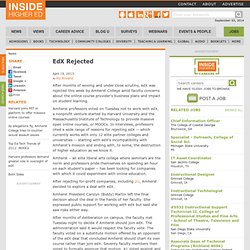

Coursera pivots to address additional markets. I don’t think the company’s vision has changed, but their strategy has. While previously planning to work only with ‘elite’ institutions , Coursera has cast a wider net to include several state systems. “[Coursera co-founder Daphne] Koller said she realized that state systems educate about 70 percent of the students in the country. So, Koller said, her desire to improve education in the United States needs to involve state systems.” U Wisconsin Pilots Online Flex Option, 100 Students Could Earn Free Credits. Distance Learning | News U Wisconsin Pilots Online Flex Option, 100 Students Could Earn Free Credits By Dian Schaffhauser01/07/13 The University of Wisconsin System is experimenting with a new "flex" program that allows non-traditional students to obtain course credits through massive open online courses (MOOCs), online classes, and assessment.

The first 100 students to participate in a pilot program may receive those credits free. A major component of the initiative is to encourage progress toward a degree based on assessments of competency in a subject area, not seat time in a classroom. The Flexible Option, announced in the fall by U Wisconsin System President Kevin Reilly and the U Wisconsin Extension program, will launch with two three-credit courses--college algebra and elementary statistics. Udacity - Educating the 21st Century. Coursera's fee-based course option. Education startup Coursera partners with 12 new universities, raises $3.7M and hits 1.5M students.
As we wrote back in April, there’s no doubt that the Internet is revolutionizing education, as more and more companies continue to emerge and alter the way we learn. We’ve kept a close eye on edX, Khan Academy, Academic Earth, P2PU, Skillshare and Codecademy, and rounding out that list is Coursera, one of the youngest of the bunch, which recently raised $16 million to launch with 37 undergraduate and graduate-level courses. Now, since starting off with the likes of Princeton and Stanford, Coursera is announcing 12 new university partnerships, $3.7M in equity investments from Caltech, Penn and existing investors, and a total of 1.5M student users from 190 different countries.
Despite courtship Amherst decides to shy away from star MOOC provider. After months of wooing and under close scrutiny, edX was rejected this week by Amherst College amid faculty concerns about the online course provider's business plans and impact on student learning.

Amherst professors voted on Tuesday not to work with edX, a nonprofit venture started by Harvard University and the Massachusetts Institute of Technology to provide massive open online courses, or MOOCs. ‘Leveraging the best of many worlds’: Thrun rebuts detractor. The Udacity/Georgia Tech/AT&T partnership to provide a low-cost Masters program in computer science has drawn many accolades as well as no small amount of criticism since it was announced six weeks ago.

Numbered among the critics is Dr. Christopher Newfield from UC Santa Barbara whose article appeared yesterday in Inside Higher Ed. Newfield’s analysis of the program’s budget caught the attention of Udacity’s Sebastian Thrun, who graciously attempted to clear up some misunderstandings. MOOC: Massive Open Online Course. A First for Udacity: Transfer Credit at a U.S. University for One of Its Courses - Technology.
By Katherine Mangan A Colorado university is announcing on Thursday that it will give full transfer credit to students who complete a free introductory computer-science course offered by the online-education start-up company Udacity.

The announcement, by Colorado State University-Global Campus, is a milestone for the Stanford University spinoff. This is the first time a university in the United States has offered academic credit for a Udacity course, although several universities in Austria and Germany already do. The course, "Introduction to Computer Science: Building a Search Engine," teaches basic computer-science skills by having students build a Web search engine similar to Google.
Students enrolled in the free, online course also learn the basics of the programming language Python. Student persistence in rigorous Massive Open Online Courses. Only 7,000 out of 155,000 students who registered for the inaugural offering of the edX MOOC Circuits & Electronics went on to pass the class.

By surveying students who were still in the course near the end, researchers gained a snapshot of that demographic, the large majority of whom ultimately passed the course. 80% indicated they had taken a comparable course at a traditional university.Nearly two-thirds indicated the edX course was better.96% indicated they had previously taken calculus.About 30% did not have a Bachelor’s degree.Age groups represented by percentage: 18-25 (45%), 26+ (50%), High School (5%) The research would seem to indicate that students who had previously taken traditional university courses and who had taken calculus were more likely to persist. The Problems with Peer Grading in Coursera. Companies Create MOOCs To Fill Skills Gaps - Education - Online.
Try college for free this fall at ETSU. Can Freshman Composition be MOOC-ified? Freshman composition is one of the foundational courses that most incoming students need to tackle.

It’s also one that requires more feedback from the instructor: Students that haven’t been prepared to write at the college level are shepherded through the intricacies of style, diction, and more.